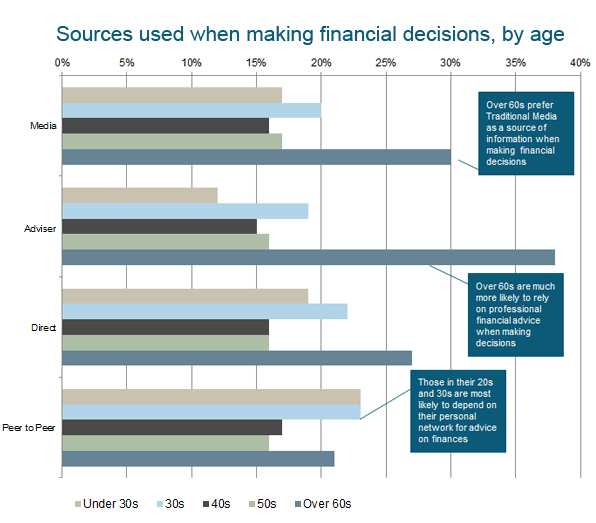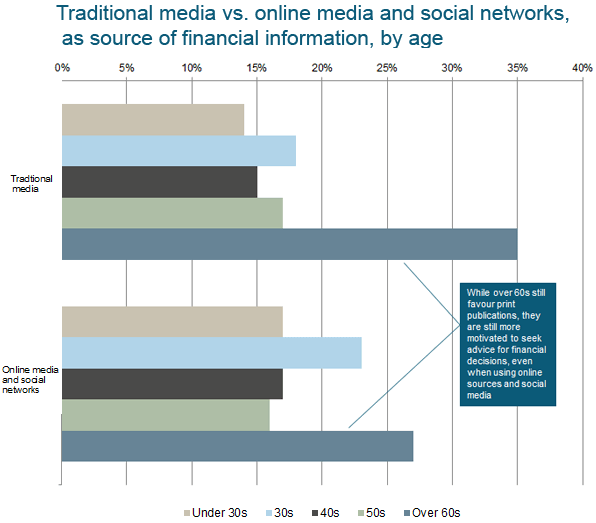Over three-quarters of consumers (76%) turn to the media as their most trusted source of advice when making financial decisions, according to a new study from PR firm Lansons in conjunction with Opinium Research. Media sources have even grown in the general public’s estimation, with an additional 21% using media as a source for financial advice compared with 2012.
Media sources
This is broken down across dedicated financial or money websites, including This is Money and, Moneywise (39%), news on national television (24%) and the personal, finance-focused pages in national newspapers (23%).
The personal finance pages of the national news pages hold particular significance for the over-55s who are most likely to turn to them for assistance. This is also true for higher-rate tax payers, who are significantly more likely to turn to the national newspapers (37% compared with 24% of basic rate tax payers).
The over-55s are also much more likely to make use of dedicated money websites than any other form of online media (40%), suggesting that older consumers are more than willing to go online if they feel the content will help their wallets.

Other sources
Whilst the media proves more influential than other sources, people also look for information directly from providers and searches online (54%), their peers (50%) and financial services professionals (26%). It is therefore important for organisations to be consistent with their messages across all outlets.
However, the importance of these sources varies significantly across different groups: The over-60s are much more likely to rely on professional financial advice when making decisions, being almost twice as likely to turn to advisers for help as any other age group (26% compared with 38%), as are Londoners when compared with other regions in the UK. Women are significantly more likely to depend on advice from their personal networks when making financial decisions (59% compared with 41%). Younger people (18-34) are more than twice as likely as any other age group to look to online commentary or blogs written by financial service providers for advice and to follow journalists and newspapers across social media channel.
On average, UK adults consult at least four sources before making a definitive financial decision, with Londoners being the most thorough; seeking out advice from up to six sources. These tendencies underline the importance of a multi-channel approach for businesses looking to influence and inform potential customers.

The importance of online content
More than two-thirds (69%) of Brits use online media and social networks when making money decisions, as digital news sources continue to grow in importance for UK consumers. The research shows that media sources with free online access are far more popular than paid-to-read content; whilst 19% of Brits relied on newspaper websites that are free to view, only 6% used sites behind paywalls. This follows News UK scrapping The Sun’s paywall following a decline in its readership and digital advertising revenues. However, it’s interesting to note that younger people are far more likely to be willing to subscribe to paid-for content (10%), perhaps indicating that perceptions of paying for online news will shift in the future.
Louise Ahuja, director at Lansons, says: “The results reveal that it is more important than ever for financial service providers and their comms teams to know their audience and understand how they make financial decisions. Companies waste a lot of time and effort by not understanding the importance of reaching their audiences via the right media. The recent developments in the pensions, savings and investment environment means that knowing where your customer is looking for advice and ensuring an integrated corporate message throughout all of those channels has never been more important.”
Alexa Nightingale, head of financial services at Opinium Research, adds: “With consumers faced with an abundance of information sources to inform their financial decisions, our clients are increasingly turning to us to help them navigate this more complex and fragmented customer journey. Understanding the key influences at each stage is crucial to engage your target audience and differentiate your brand.”
Methodology
Opinium Research conducted 2,002 online interviews with UK adults from 4 to 9 November 2015. The sample has been weighted to reflect a nationally representative audience.
PR Masterclass: The Intersection of PR and GEO
Join PRmoment for a Masterclass featuring 10 of the industry’s foremost experts. You will walk away with a clear, actionable strategy for adapting your content to an AI-first search environment.
Taking place on Wednesday 25th February in London, both virtual and in person tickets are available.
Early bird ticket sale ends Friday 9 January.
PR MasterclassIf you enjoyed this article, sign up for free to our twice weekly editorial alert.
We have six email alerts in total - covering ESG, internal comms, PR jobs and events. Enter your email address below to find out more:









